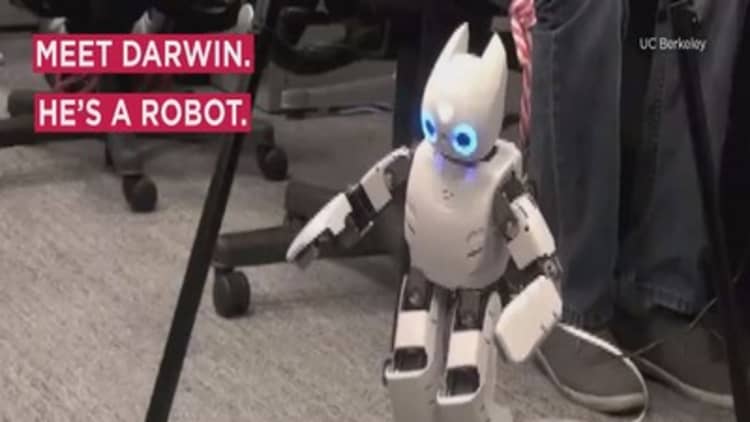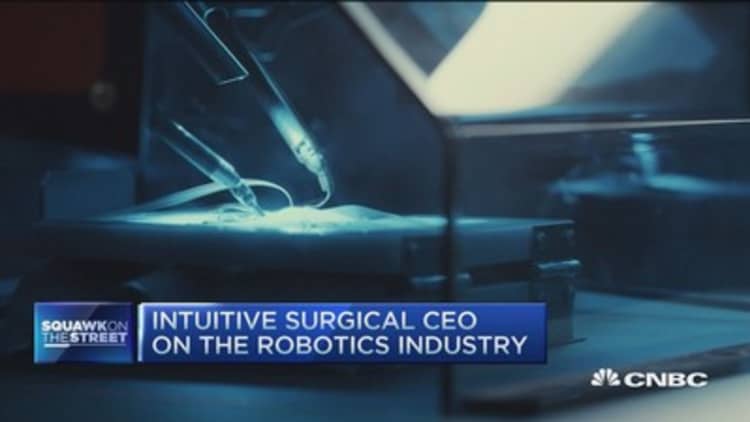For years, workers have feared how automation may threaten their jobs in the future. Now, their bosses may be feeling those same jitters.
Consulting firm Accenture recently surveyed a wide group of managers about their attitudes on cognitive computing and the future of the workforce. The study — conducted in August and September of this year across 17 different industries — surveyed more than 1,700 managers and found that while many managers believe intelligent machines will make them more effective, some are concerned these machines may threaten their jobs in the future.
These managers feel as though they are currently spending most of their time on tasks that intelligent machines can automate in the future, according to Accenture's findings.
Source: Accenture Strategy
Moreover, managers in the tech industry are most concerned that intelligent machines could threaten their positions: Some 50 percent in the survey felt this way, according to the firm. Managers in the banking sector also felt similarly (49 percent), as did bosses in the airline sector (42 percent), and retail (41 percent).
White collar worries
Accenture's findings dovetailed with growing worries in the white collar workforce over the threat posed to their jobs by the rise in automation. The technological phenomenon has what IBM refers to as the "potential to transform businesses, governments and society."
Recently, billionaire investor Jeff Greene told CNBC that artificial intelligence (AI), machine learning, big data and robotics could reshape the fundamentals of white collar labor. Robotics are playing a role in fields as diverse as medicine and journalism.
The effect could be similar to what globalization did to blue-collar positions in the manufacturing sector, which lost more than 3 million jobs between 2001 and 2013, according to data from the Economic Policy Institute.
"Just look at an Amazon distribution center, the robots are stocking the shelves. Go take a look at the video of a Tesla factory, the welders are robots," Greene told CNBC. "This is really happening. This is not 'The Jetsons' anymore. This is happening today."
Some robots are already making their presence felt in retail. In fact, both Best Buy and Orchard Supply Hardware, a chain owned by Lowe's, have customer service robots roaming their retail floors in select stores.
In response to inquiries from CNBC, both companies said that the use of machines are intended to alleviate the workload of employees, allowing them to focus on more complicated tasks rather than completely taking over their jobs.
Stop sweating over it!




However, some experts contend that technology isn't so bad, and reflects historical anxiety over technology that ultimately made workplaces more efficient and created more jobs.
"People have worried about this for hundreds of years," said Harry Holzer, professor of public policy at Georgetown University. "And it's never turned out to be a big problem."
Holzer said that while a "tech takeover" could hurt people who directly get displaced, it wouldn't drastically impair the overall economy.
"It has never meant rising unemployment over time, because the economy has found a way to create new jobs as the old ones are lost," he added.
Holzer said automation in the workforce could actually make products cheaper to buy, therefore leaving more cash in people's pockets to purchase additional items. This drop in price for these products might raise employment in these sectors.
"If the technology of production gets cheap enough and the price goes down enough, all of a sudden there can be a huge increase in how middle-class people can buy them," said Holzer.
Yet Holzer questioned whether this time could be different. "Will it be different in the future simply because the pace of the change will be so fast that it will overwhelm this adjustment process?"
People like Greene say yes. The investor told CNBC that the U.S. used to have a relatively closed economy. Now, labor gets replaced either with a tech solution or cheaper foreign-born labor.
But Holzer said that thus far, the labor market has yet to see evidence of sweeping automation changing the workplace. In fact, he said productivity and turnover have fallen.
"If you believe the robot story, productivity and churning should be going up," he said. "The basic facts right now don't seem to be fitting that story."
AI "may present more challenges to more people, even highly educated people, but will it be this tidal wave that's going to kind of sweep aside the labor market?" Holzer asked. "I don't think so."



